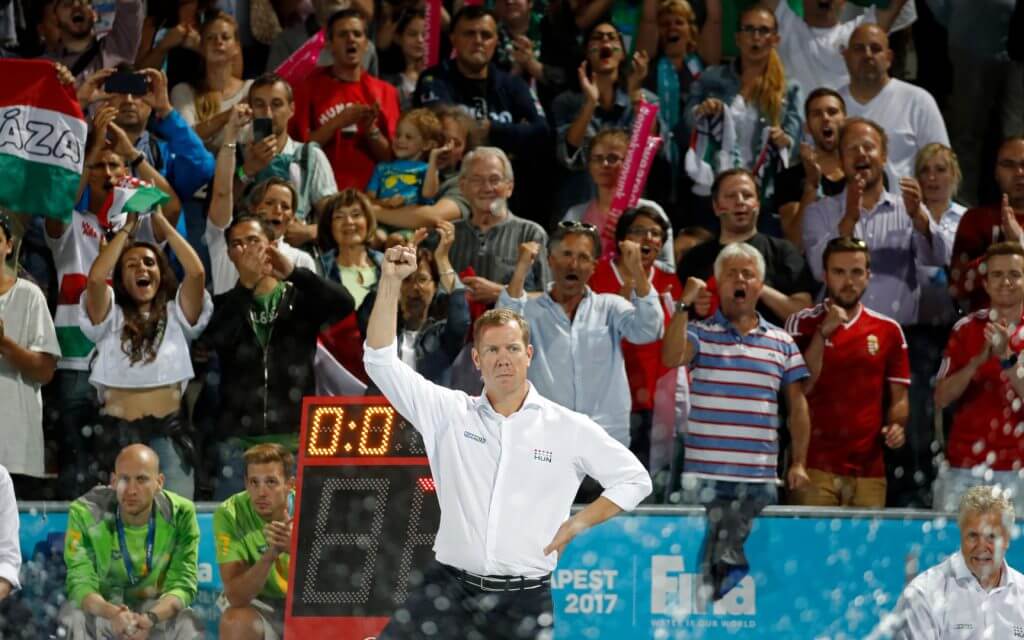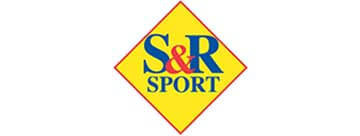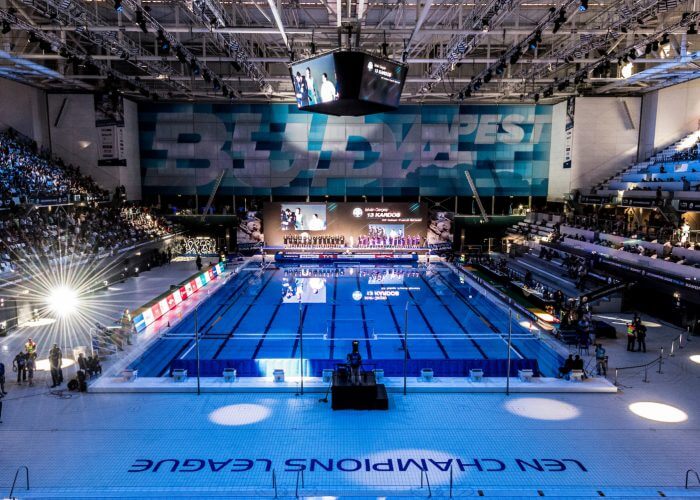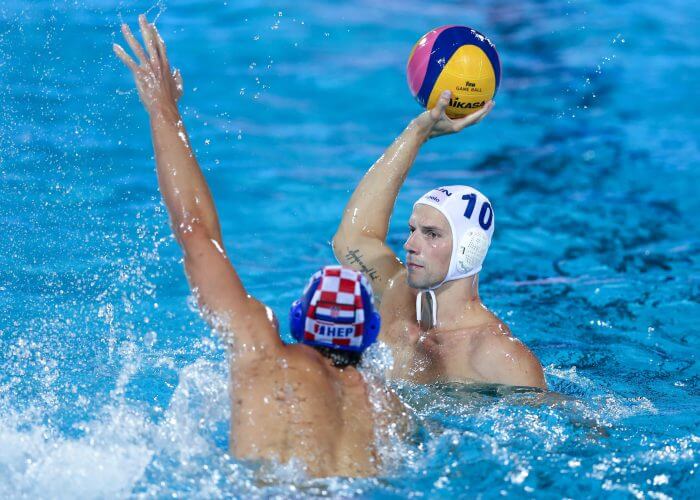On The Record with Tamás Märcz, Hungarian Men’s Water Polo Coach

Editorial content for the 2019 NCAA DI Men's Swimming & Diving Championships coverage is sponsored by S&R Sport.
See full event coverage.
Follow S&R Sport on Instagram at @srsportaquatics

With a 9-8 win over Spain last month in the final of the 34th LEN European Water Polo Championship, the Hungarian men not only captured gold in front of their countrymen in Budapest’s Duna Aréna, they qualified for the 2020 Tokyo Olympics.
[Hungarian Fans Ecstatic as Men Beat Spain 14-13 for 2020 European Water Polo Championship Gold]
This victory is a long time coming; the last time Hungary won the European Championship, was 1999—on the cusp of a new millennium a brilliant run by the Magyars in the first three Olympics of the new century: gold in the 2000, 2004 and 2008 Games.

Duna Aréna, Budapest. Photo Courtesy: LEN
Despite this unprecedented run of success, the closest the Hungarians got to gold during the first two decades of the 21st Century were second-place finishes to Serbia in 2006 and 2014. The finals loss six years ago was particularly galling. Not only did it take place in the Alfred Hajos Pool on Margaret Island—Budapest’s legendary polo venue—the Serbians raced out to a 7-2 halftime lead on their way to a 12-7 win. The win was part of a dominant run by Serbia that stretched to four consecutive Euro titles as well as gold in the 2016 Olympics.
Fast forward to this year’s European Championship, and Serbia is no longer the power it once was, Spain is now Hungary’s rival for supremacy on the continent and the ultimate prize—Olympic gold—is there for the taking by Head Coach Tamás Märcz’s squad.
Swimming World posed questions by email to Märcz, the Hungarian coach who has restored his country to the glory that he knew as a player two decades ago, when he backstopped his teammates to Euro then Olympic gold in back-to-back years.
– The last time Hungary won the European Championship, it was the beginning of a run of unparalleled Olympic success. You were there in 1999; what are the similarities of these teams two decades apart?
In 1999, we also felt we had a chance to enter the European Championship, as a new era began in the late ’90s and we had some great achievements, such as the Seville European Championship gold medal or the World Championship silver medal in Perth. There were signs here too, as in previous years with some results like the World Cup gold and the European Cup gold, we could say that we were not the only big chance in the tournament then and now.
– An interesting contrast on this squad is captain Denes Varga, who going to his fourth Olympics, and Krisztian Manhercz, who will be going to his second. How will this blend of experience and youth play out for Hungary in the 2020 Olympics.
After the 2017 World Cup in Budapest, we started giving our youngsters space and continued to gain important experience in the absence of older players. Now we have reached a time when the young have entered the international arena and our experienced senior players have come back ambitious and motivated—and both have a good time together.

Hungarian captain Denes Varga. Photo Courtesy: SIPA USA
– We’ve spoken about this before; how important was it to you and your players to win European Championship gold at the Duna Aréna?
Only in the 2000s did we fail several times in a domestic environment. I have experienced twice (World Championship Final 2017 and World League Final 2018) how to lose in front of 8,000 people in the final and some of my current players have been with me at those moments.
At home, they always expect the maximum, regardless of the fact that nowadays it is increasingly difficult to get close to the podium, let alone to the top, as the international elite has expanded and there are many excellent teams. That’s why we wanted to break this long series of negatives that would give us extra strength for the future.
– A fascinating subplot is the shoot-out with the Spaniard. You have a chance to win the shootout and you substitute Vogel Soma, who makes the critical save. Talk about how that decision came about.
Already at the very beginning of the penalty shots I decided that if Viktor Nagy does not save three times, I would replace the goalkeeper. I also signaled to Vogel Soma to get ready behind the bench, to be in the most deployable condition. Soma is a very good penalty taker so I was sure if we didn’t get in the way then we could have a good chance of winning the penalty duel.
– The Spaniards have been in the last two major finals—Euro Championships and FINA Worlds—and both times they’ve beaten a veteran Croatia team to get there. Does this signal a change in the hierarchy of international polo?
The Spanish team has already played its third final in the series, which is no coincidence. It seems that especially the Slavic teams do not like the Spanish style. They play very smart and modern water polo, they are hard to beat, they never give up. Their team has been getting better in recent years.
[Rotterdam Beckons as Final Hope For 2020 Tokyo Men’s Water Polo Aspirants]
I think a lot of teams have a chance to win the gold medal in the Olympics, so do Spain and Croatia, but in addition there could be three to four teams for the most important medal, and I think there will be a Hungarian team among them.
– Clearly, the other benefit of your success at the Euro Championships is that you have qualified for the Olympics. How will this time advance your preparation for Tokyo?
The first important benefit is that our players do not have to go to the last qualifying tournament. The Hungarian League is the most intense and our players are already playing a lot of matches, so it is a great advantage that they do not have to be in top form again in March.
According to the decision of the Hungarian League, we can also take a short break in the Championship in March, which will be a good thing for the players, as they did not rest this winter due to the European Championship in January. We can plan our summer right now, which is also a big benefit and most importantly we will be there for the Olympics




.png)
